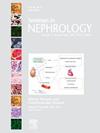求助PDF
{"title":"遗传信息在肾移植和活体捐献管理中的应用。","authors":"Yasar Caliskan, Christie P Thomas","doi":"10.1016/j.semnephrol.2025.151658","DOIUrl":null,"url":null,"abstract":"<p><p>Kidney transplantation is the best treatment for kidney failure in eligible patients, significantly improving survival and quality of life. While short-term post-transplant survival has improved, long-term outcomes remain limited. Advances in genetic research have the potential to transform kidney transplantation. The shortage of donor organs underscores the need for improved organ availability, optimized immunosuppression, and enhanced monitoring to minimize repeat transplants. Improved understanding of monogenic kidney diseases and availability of genetic testing are increasingly informing the evaluation of transplant candidates and living donors. Expanding genetic testing to include pharmacogenomics and improved immunologic matching between transplant recipients and donors can improve post-transplant outcomes. Living kidney donors have perioperative risks and a 5-10 times higher likelihood of developing kidney failure, particularly if biologically related to the recipient. Some of this risk may be attributable to genetic factors that should be ascertained during donor evaluation. Polygenic risk scores offer promise for early risk identification, personalized interventions, and better long-term outcomes, though further validation is needed across diverse populations. Additionally, gene-editing technologies and personalized genomics may enhance donor-recipient compatibility, reduce graft rejection, and improve transplant success. These advancements in precision medicine are set to transform kidney transplantation by improving patient care and allograft longevity. Semin Nephrol 36:x-xx © 20XX Elsevier Inc. All rights reserved.</p>","PeriodicalId":21756,"journal":{"name":"Seminars in nephrology","volume":" ","pages":"151658"},"PeriodicalIF":3.5000,"publicationDate":"2025-07-01","publicationTypes":"Journal Article","fieldsOfStudy":null,"isOpenAccess":false,"openAccessPdf":"","citationCount":"0","resultStr":"{\"title\":\"Utility of Genetic Information for Management in Kidney Transplantation and Living Donation.\",\"authors\":\"Yasar Caliskan, Christie P Thomas\",\"doi\":\"10.1016/j.semnephrol.2025.151658\",\"DOIUrl\":null,\"url\":null,\"abstract\":\"<p><p>Kidney transplantation is the best treatment for kidney failure in eligible patients, significantly improving survival and quality of life. While short-term post-transplant survival has improved, long-term outcomes remain limited. Advances in genetic research have the potential to transform kidney transplantation. The shortage of donor organs underscores the need for improved organ availability, optimized immunosuppression, and enhanced monitoring to minimize repeat transplants. Improved understanding of monogenic kidney diseases and availability of genetic testing are increasingly informing the evaluation of transplant candidates and living donors. Expanding genetic testing to include pharmacogenomics and improved immunologic matching between transplant recipients and donors can improve post-transplant outcomes. Living kidney donors have perioperative risks and a 5-10 times higher likelihood of developing kidney failure, particularly if biologically related to the recipient. Some of this risk may be attributable to genetic factors that should be ascertained during donor evaluation. Polygenic risk scores offer promise for early risk identification, personalized interventions, and better long-term outcomes, though further validation is needed across diverse populations. Additionally, gene-editing technologies and personalized genomics may enhance donor-recipient compatibility, reduce graft rejection, and improve transplant success. These advancements in precision medicine are set to transform kidney transplantation by improving patient care and allograft longevity. Semin Nephrol 36:x-xx © 20XX Elsevier Inc. All rights reserved.</p>\",\"PeriodicalId\":21756,\"journal\":{\"name\":\"Seminars in nephrology\",\"volume\":\" \",\"pages\":\"151658\"},\"PeriodicalIF\":3.5000,\"publicationDate\":\"2025-07-01\",\"publicationTypes\":\"Journal Article\",\"fieldsOfStudy\":null,\"isOpenAccess\":false,\"openAccessPdf\":\"\",\"citationCount\":\"0\",\"resultStr\":null,\"platform\":\"Semanticscholar\",\"paperid\":null,\"PeriodicalName\":\"Seminars in nephrology\",\"FirstCategoryId\":\"3\",\"ListUrlMain\":\"https://doi.org/10.1016/j.semnephrol.2025.151658\",\"RegionNum\":3,\"RegionCategory\":\"医学\",\"ArticlePicture\":[],\"TitleCN\":null,\"AbstractTextCN\":null,\"PMCID\":null,\"EPubDate\":\"2025/7/17 0:00:00\",\"PubModel\":\"Epub\",\"JCR\":\"Q2\",\"JCRName\":\"UROLOGY & NEPHROLOGY\",\"Score\":null,\"Total\":0}","platform":"Semanticscholar","paperid":null,"PeriodicalName":"Seminars in nephrology","FirstCategoryId":"3","ListUrlMain":"https://doi.org/10.1016/j.semnephrol.2025.151658","RegionNum":3,"RegionCategory":"医学","ArticlePicture":[],"TitleCN":null,"AbstractTextCN":null,"PMCID":null,"EPubDate":"2025/7/17 0:00:00","PubModel":"Epub","JCR":"Q2","JCRName":"UROLOGY & NEPHROLOGY","Score":null,"Total":0}
引用次数: 0
引用
批量引用

 求助内容:
求助内容: 应助结果提醒方式:
应助结果提醒方式:


